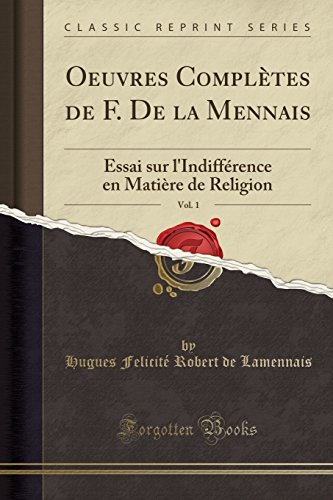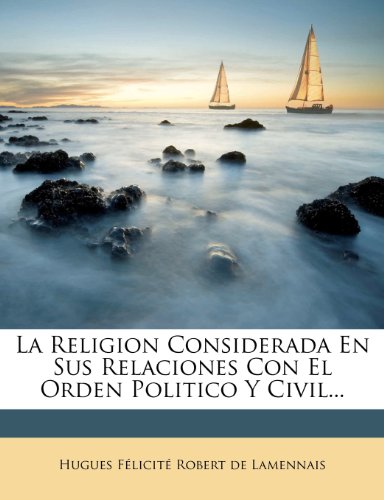Background
He was born on June 29, 1782, at St. Malo, in Britanny, France.



(Excerpt from Oeuvres Complètes de F. De la Mennais, Vol. ...)
Excerpt from Oeuvres Complètes de F. De la Mennais, Vol. 1: Essai sur l'Indifférence en Matière de Religion Or, quand on vient à considérer ce prodi gieux égarement, on éprouve je ne sais quelle indicible pitié pour la nature humaine; car se peut-il concevoir de condition plus misérable que celle d'un être également ignorant de ses devoirs et de ses destinées; et un plus étrange renversement de la raison que de mettre son bonheur et son orgueil dans cette ignorance même, qui devroit être bien plutôt le sujet d'un inconsolable gémissement? About the Publisher Forgotten Books publishes hundreds of thousands of rare and classic books. Find more at www.forgottenbooks.com This book is a reproduction of an important historical work. Forgotten Books uses state-of-the-art technology to digitally reconstruct the work, preserving the original format whilst repairing imperfections present in the aged copy. In rare cases, an imperfection in the original, such as a blemish or missing page, may be replicated in our edition. We do, however, repair the vast majority of imperfections successfully; any imperfections that remain are intentionally left to preserve the state of such historical works.
http://www.amazon.com/gp/product/0282092447/?tag=2022091-20

(This is a reproduction of a book published before 1923. T...)
This is a reproduction of a book published before 1923. This book may have occasional imperfections such as missing or blurred pages, poor pictures, errant marks, etc. that were either part of the original artifact, or were introduced by the scanning process. We believe this work is culturally important, and despite the imperfections, have elected to bring it back into print as part of our continuing commitment to the preservation of printed works worldwide. We appreciate your understanding of the imperfections in the preservation process, and hope you enjoy this valuable book. ++++ The below data was compiled from various identification fields in the bibliographic record of this title. This data is provided as an additional tool in helping to ensure edition identification: ++++ La Religion Considerada En Sus Relaciones Con El Orden Politico Y Civil Hugues Félicité Robert de Lamennais Impr. de Aparicio, 1826 Religion; Religion, Politics & State; Església i Estat; Religion / Religion, Politics & State
http://www.amazon.com/gp/product/1278526323/?tag=2022091-20
He was born on June 29, 1782, at St. Malo, in Britanny, France.
His father, a merchant, sent Félicité and his older brother Jean Pierre to be educated by an uncle, who penalized the younger boy for minor infractions by secluding him in a well-stocked library, and thus afforded him opportunity to develop a catholic taste in literature, especially the works of Jean Jacques Rousseau.
His collaboration with Jean Pierre produced, in 1808, Réflexions sur l'état de l'église en France pendant le dix-huitièmedix siècle et sur la situation actuelle, which recommended drastic reforms and particularly offended Napoleon I. The police suppressed this work and a second book prepared by Lamennais attacking the emperor's right to make ecclesiastical appointments. The ultramontane, or anti-Gallican, position here enunciated was to become a rallying slogan for a large section of the younger clergy who accepted Lamennais's leadership following his ordination as a priest on Mar. 9, 1817.
Lamennais's second venture in Catholic apologetics, Essai sur l'indifférence en matière de religion (1817), was enthusiastically received under the new regime of Louis XVIII, but when he expanded it (Vol. 2, 1820; Vol. 3 and 4, 1823) the implications of his philosophy raised doubts concerning his orthodoxy. Pope Leo XII approved the work, however, and the Lamennais brothers joined with other priests to found the Congrégation de St. Pierre to promote the intellectual regeneration of the Church in France. The society's career was aborted by the Revolution of 1830. This event precipitated latent libertarian tendencies in Lamennais's philosophy. They took the form of ardent defense of Church liberties, by means of an "Agency" which he set up together with Montalembert, Lacordaire, and others; of an avowal of republican principles; and of the foundation of a Liberal journal, L'Avenir (1830). Lamennais sought, and was denied, approval for his position on the part of Pope Gregory XIV, and after two years of meditation he openly separated himself from the Church in Paroles d'un croyant (1834), probably his most original work, which Gregory forthwith condemned.
Lamennais now embarked on a career of vehement pamphleteering in which he championed unpopular causes; his essay Le Pays et le gouvernement (1840) earned him a year in prison. After his release appeared the Esquisse d'une philosophie in four volumes (1841 - 1846), best remembered for a brilliant study of art in volume three. The establishment of the Second Republic in 1848 permitted Lamennais to become a deputy in the legislature, associated with the Left, and editor of the journal Le Peuple constituant, but the coup of Napoleon III closed his foray into politics. His most significant production thereafter was an esteemed translation of Dante's Divina commedia. Earlier translations were those of Louis de Blois's Speculum monachorum (1809) and of Thomas àa Kempis' De Imitatione Christi (1824).
(This is a reproduction of a book published before 1923. T...)
(Excerpt from Oeuvres Complètes de F. De la Mennais, Vol. ...)
After reluctant association with his father's business and a period of doubt concerning aspects of the Catholic faith, Félicité was won over by Jean Pierre, then a priest, to devote himself to the Church.
In December 1833 renounced his ecclesiastical functions and abandoned all external profession of Christianity.
He authored a pamphlet criticizing the 1825 Anti-Sacrilege Law introduced by Villèle's administration. Lamennais sympathized with the Revolution of 1848 and was elected a deputy for Paris to the Constituent Assembly.
